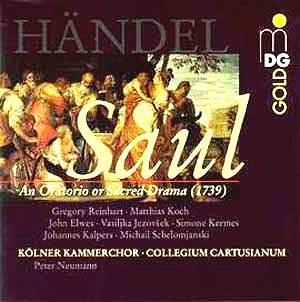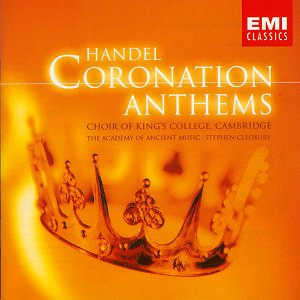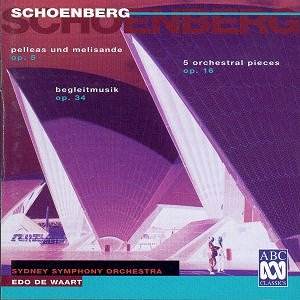 Composer: Georg Friedrich Handel
Composer: Georg Friedrich Handel
Works: Saul HWV 53
Performers: Gregory Reinhart (Saul), Matthias Koch (David), John Elwes (Jonathan), Vasilijka Jezovsek (Michal), Simone Kermes (Merab), Johannes Kalpers (High Priest), Michail Schelomjanskis (Samuel), Kölner Kammerchor, Collegium Cartusianum, Peter Neumann
Recording: Live recording, June 11, 1997, Trinitatiskirche, Köln, Germany
Label: MDG
Handel’s “Saul,” composed in 1738 and first performed the following year, emerges as a pivotal work in the transition from opera to oratorio, reflecting both the composer’s artistic evolution and the shifting tastes of his audience. At a time when opera was becoming increasingly extravagant and financially burdensome, Handel turned to the oratorio format, which allowed for a more intimate yet still dramatically rich narrative. “Saul,” based on the biblical accounts of the first king of Israel, captures the psychological complexities and moral ambiguities of its characters, particularly the tragic figure of Saul, which Handel portrays with an intensity that resonates through the ages.
Peter Neumann’s interpretation of “Saul” offers a compelling examination of Handel’s dramatic intent, with a particularly notable performance by bass Gregory Reinhart in the title role. Reinhart’s voice is both commanding and nuanced, successfully conveying the tormented psyche of Saul as he grapples with jealousy and madness. The absence of lengthy arias characteristic of Handel’s earlier works results in a fragmented structure, with 87 distinct sections that encompass recitatives, choral interjections, and brief arias. This fragmentation poses a challenge; however, Reinhart’s ability to imbue each moment with emotional weight allows listeners to appreciate the work’s dramatic arc. The duets between David and Jonathan, performed by Matthias Koch and John Elwes respectively, are especially poignant, capturing the deep bond and impending tragedy of their relationship.
The recording, captured live in the acoustically vibrant Trinitatiskirche, presents both advantages and challenges. The clarity of the ensemble is commendable, with each voice and instrumental line discernible, though the crispness of the church’s sound contrasts with the warmth typically associated with the theatrical settings for which Handel intended these works. The Kölner Kammerchor delivers a robust choral performance, though their contributions, while excellent, are somewhat limited in “Saul” compared to other Handel oratorios such as “Belshazzar” or “Susanna,” where choral forces play a more central role. The precision of the Collegium Cartusianum under Neumann’s direction brings an undeniable energy to the orchestral passages, though there are moments where one longs for a more sumptuous orchestral texture that would enhance the emotional landscape of the music.
The engineering quality of this MDG release stands out, with a clear, balanced sound that captures the live atmosphere without compromising detail. However, one might argue that the recording does not fully encapsulate the dramatic richness that a warmer venue could provide, thus slightly diminishing the impact of some pivotal moments, particularly in the orchestral interludes. The opening four-movement instrumental Symphony, with its vibrant contrasts and grand gestures, sets a high standard but could benefit from a more enveloping acoustic.
The overall impression of Neumann’s “Saul” is one of earnest engagement with Handel’s text and music. While it may not reach the dramatic heights of Handel’s most celebrated works, the quality of the performers and the meticulous attention to the score’s intricacies ensure that this recording remains a significant contribution to the discography of Handel’s oratorios. The performers’ dedication shines through, and the recording serves both as an introduction to the work for newcomers and a thoughtful interpretation for long-time admirers. Though it may not supplant definitive versions of Handel’s oeuvre, it certainly stands as a commendable effort that captures the essence of “Saul” and brings its dramatic narrative to life.



